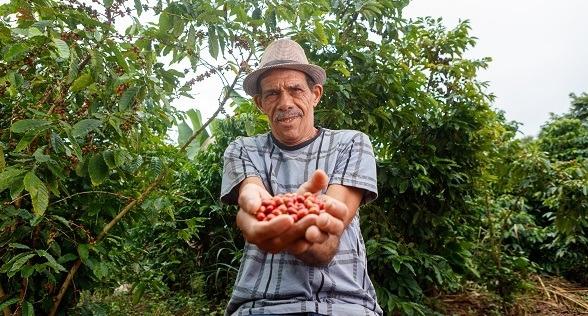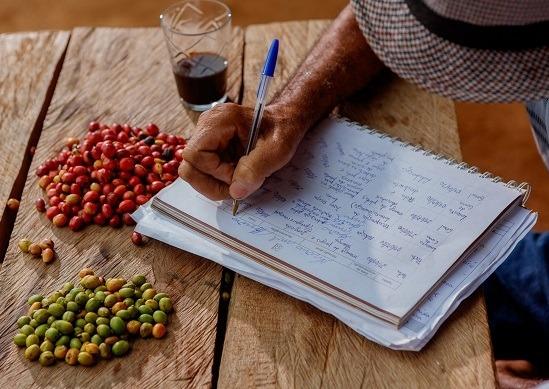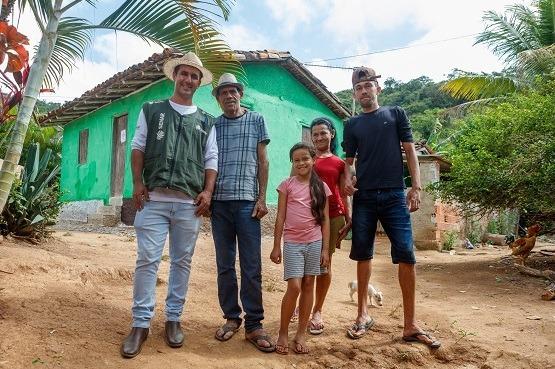When he was 15 years old, Anísio Nunes Cordeiro planted the first coffee seedlings on a rural property located in Água Boa (Minas Gerais state), in the Jequitinhonha Valley region. He was delighted, but between “comings and goings”, 46 years have passed, and only now, at the age of 61, does the producer support his family by working on his own coffee plantation.
The first time he saw a coffee plantation was in Espírito Santo when, as a teenager, he traveled with his family to visit an uncle in the state’s countryside. He was delighted with “all those coffee trees.” When he returned to his hometown in Minas, he brought back the memory and the seeds to start planting.
But the dream of having his own coffee plantation had to wait because Anísio had to take care of “other tasks” that were more urgent on the property. As he says, he went on like this for years, “making a living” for his family, but still without fulfilling his dream of having his own coffee plantation.

When he was married to Maria de Fátima Rodrigues Cordeiro and already had eight children, Anísio once again saw in coffee the possibility to make everything better and decided to invest in his own production. “In the beginning, the production was good, but I got careless, I stopped fertilizing the land. The production started to drop. And then there was one time when fire destroyed everything.”
When he was discouraged and almost giving up, he learned about Technical and Managerial Assistance (ATeG) from SENAR and attended a meeting at the Rural Union in Água Boa. That was when his circumstances began to change. When he started the first assistance sessions on his Anísio’s farm, SENAR’s Field Technician Francy Santos determined that the crop, although degraded, had great productive potential.
“The first thing we did was the soil analysis, we fertilized, and we improved the management of the property.

Along with these actions, we also organized the managerial part, which did not exist,” says the technician.
The results materialized after the first year of SENAR’s assistance. Production increased, and Anísio started to dry coffee on his property instead of selling it green (unripe). He and his family finally saw their income increase. “We worked internally so that he could produce quality coffee and triple the sales value of his product,” says the SENAR technician.
Anísio acknowledges the importance of the service. “After SENAR came to the farm, I learned how to dry coffee properly and wait for the right moment to sell it. With these teachings, I started to make a profit, life changed, and I no longer have debts,” the producer highlights.
The good results of the harvest reflected the improvement in the quality of the family’s life. “I fixed up my house, bought a refrigerator, built a balcony, all made of ceramic, painted the house green—which is the coffee’s color—and helped my boy buy a motorcycle.”

Even communication with the family became easier. The couple talks via video calls with their children and grandchildren who stayed in Espírito Santo daily.
The couple remembers the commitment of the SENAR field technician as a factor that made all the difference in the success of their coffee production. “Francy came and never left. There were days when I told Maria: ‘With this rain, he is not coming.’ But even with that rain, it was just a matter of waiting to hear the noise of his motorcycle,” remembers Anísio.
Plans for the future
In a notebook, Anísio also writes down his plans for the future concerning the harvests. “I want to buy a brush cutter with the money left over. If I can, I want to buy a cart too, right? So that we can walk around here. And, God willing, one day I’ll be able to bring my children back.”
The SENAR field technician confirms with data the rural producer’s expectations. “This year, in the 2022-2023 crop, we will harvest an average of 150 sacks and have a good sale price. In addition, we will already start preparing the land to plant new coffee seedlings. The work that I do here with Anísio is one of the jobs that fills me with pride,” Francy points out.
Today, the 61-year-old rural producer, better known as “Seu [Mr.] Anísio,” is still moved by the vision of the coffee plantation that he had when he was only 15 years old. The difference is that today he has managed to make that dream come true on his property. “I don’t want to leave here anymore. And I don’t even have to work outside. Everything I do now is here on my land.”


